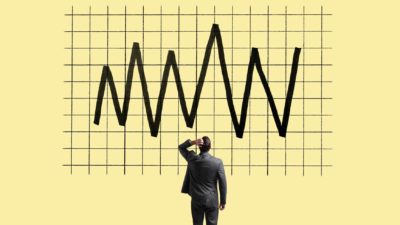What is investing?
It should be a simple question, with a simple answer, right?
And yet, I think if I polled my readers, I'd get a range of answers.
Moreover, I think people who read these thoughts probably have a relatively similar approach.
So if I asked a broader group of people, I'd almost certainly get an even larger spread.
Is it 'playing the stock market'?
'Buying and selling shares (or property)'?
'Gambling'?
'Speculation'?
Or something else?
And what does it mean to be an investor?
My thinking was prompted by a very clever article that's (again) doing the rounds of social media. I don't know the source, unfortunately, but it's incredibly clever.
It nicely skewers much of what we consider 'financial reporting'.
You know the 'race calling' of what happened on the ASX (or other markets) today.
Company X was up 0.4%.
Sector Y fell 0.3%.
That sort of stuff.
Seriously, have a read:

But, I have to say, while the parody is very funny, we need to be careful not to be too cynical.
The reporting is often factual, and does answer the sorts of questions that investors tend to ask.
The oil price falling usually leads to lower share prices for oil and gas drillers.
The likelihood of higher interest rates usually means higher bank share prices.
And so on.
The news media have a role in both reporting and explaining those things, and I think the article is probably too harsh on that part.
But where it's spot on is the 'so what'.
The oil price might fall today.
And rise tomorrow.
And fall the day after.
It might be higher in a week, and then lower in a month.
Which kinda puts the knee-jerk daily market responses in the right (ridiculous) light, huh?
Let's say you own shares in Fossil Fuels R Us (ASX: AGW), and the oil price is higher today.
That's – and I know you know this – one single day in 365 this year.
And over those 365 days, the oil price will move around like a tail-ender facing a Mitchell Starc barrage.
Now, stick with me here.
The profits of said oil driller are going to be the sum-total of the prices received every single day of the next year.
Which are both unknowable and probably volatile.
Meaning reacting to a single day's price movement is… pretty silly, to put it kindly.
Can you imagine updating the value of a cafe every day, based on the change in the number of coffees sold?
Madness, clearly.
And yet…
And yet, that's precisely what the stock market does.
But 'the stock market' isn't all of us. Here's why:
See, I own shares in around two-dozen companies.
I didn't buy or sell any of them today.
You probably didn't either.
It's not 'shareholders' who impact the price.
It's just those who transact on a given day.
Which makes daily market-watching even sillier.
Do you know who bought and sold BHP Group Ltd (ASX: BHP) shares today?
Do you know why?
And even if you did, do you know if those people are even worth paying attention to?
Are they any good? Are they often right? Do they get emotional? Are they having a good or bad day? Are they long term investors? Trend-followers? Day traders?
And yet, despite not knowing the answer to any of these questions, it's those people we ask, when we wonder what our BHP shares are worth, every time we check the share price.
Which doesn't make a lot of sense, does it?
And that takes me nicely back to my initial question: what is investing?
Because once you have your answer, it lets you put both the news and the noise in perspective.
After more than 20 years in this caper, I think I've worked out the answer.
Not the only answer, perhaps – different people have different views – but the answer that I think works best for me, and the one I've been using to advise our members now for over a decade.
And, importantly, the answer that I think gives us the best chance of really significant long-term wealth creation.
I don't want to try to out-trade high-frequency algorithmic computers. I'll lose.
And I don't want to try to beat momentum traders or trading 'systems' at their own game, with questionable strategies and even less certain odds of success.
And I keep the hell away from options trading.
The other thing?
Those tend to be zero-sum games: if I win, you have to lose.
My version of investing?
Well, the history of the stock market is very compelling. Which isn't a guarantee, of course, but for more than a century, it's been the story of phenomenal long-term value creation.
So there are a few clues there.
First, investing, over time, is probably going to continue to be a positive value creation game, not zero-sum.
Next, I think the value tends to (and will likely continue to tend to) accrue to the patient, over the active.
And I reckon that thinking like a business owner will beat trying to guess daily gyrations. Going back to my example, above, I reckon thinking about the value of a cafe's long term future beats focusing on the pops and dives of the oil price.
That lets you ask (and have a stab at answering) some very different questions.
Which businesses do I think have the brightest long-term futures?
Which businesses are trading at attractive prices, relative to those futures?
And… that's it.
I mean, that's not the end of the process, of course. Each of those questions is answered by digging a little deeper.
But those are the two headline questions. And they're very different to most of the noise of 'finance'.
It doesn't matter what happened to the Australian dollar overnight. Or to the oil price today.
It doesn't matter what happened on Wall Street last night, or what some 'expert' thinks will happen on the ASX in 2023.
It takes some effort to tune out or deprioritise the daily ASX 'race calling'.
Especially when share prices are falling, and you're feeling the pain.
(It's just as hard to tune out when they're rising, by the way… it just doesn't hurt!)
But you need to.
You need to change your focus to the businesses themselves, and the opportunities they have in front of them – over the long term.
Because that's investing.
Fool on!









